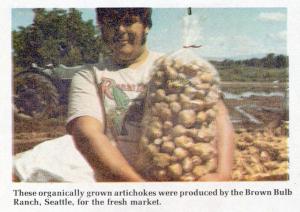1980 - Volume #4, Issue #5, Page #21
[ Sample Stories From This Issue | List of All Stories In This Issue | Print this story
| Read this issue]
Artichokes: Promising Crop For Moonshirers
 |
"It's a perennial that reproduces by its tubers so you don't have to replant," says Vince Erickson of Big Lake, Minn., who has raised about 10 acres of artichokes for each of the last 10 years, making him one of the country's largest producers of the specialty crop.
In tests by U.S. and Canadian researchers, maximum yields from the 8 to 10-ft. tall crop have reached as high as 640 gal. of alcohol per acre with an average of about 324 gal. That's more than 100 gal. over the average corn yield of 213 gal. per acre.
"You can harvest either the tops or the tubers," Erickson explains. "The sugar which produces the alcohol remains in the stalks till flowering, when it moves down into the tubers." Average yields are 10 tons of tubers, depending on the variety, while 15 to 20 tons of tops are common.
Artichokes contain the sugar fructose and store it it in the form of inulin, which can safely be eaten by diabetics. Much of the limited Jerusalem Artichoke crop currently produced is sold to "health food" stores. They can be cooked like potatoes or used raw in salads.
"Equal amounts of alcohol can be produced by fermenting either the top growth or the tubers," explains seed stock producer, Tom Lukens of the Brown Bulb Ranch in Seattle, Wash. "Research shows that the most energy efficient method is to harvest and ferment the top growth, which can be harvested at about 95 days versus 125 days for the tubers. Even if you harvest the tubers, there will be enough viable tubers left in the ground to grow back the next year."
Artichokes adapt to most climates and are hardy enough to withstand early frosts in the north and summer heat in the south. They can be grown in many areas where sugar beets, a similar crop in sugar content, will not grow.
"One other advantage is that the sugars in artichokes are available to specific yeasts with no cooking or enzymes needed, although fermentation is similar to other crops," says' Lukens. "Percentages of fermentables in the tubers often reach 18% and you can expect a beer of 7 to 9% alcohol."
Lukens says the crop is not bothered by insects or diseases and produces enough growth to choke out most weed growth. Vince Erickson has never used herbicides on his artichokes, although he does cultivate at least twice.
Erickson plans to grow 50 acres of artichokes next year for alcohol production, using a corn chopper to cut off the top growth. He leaves the tubers in the ground and simply hills them into rows with a chisel plow in the spring. He fertilizes with 2020-20 fertilizer through his irrigation system. If volunteer plants become a problem in successive crops, Erickson says conventional herbicides will kill them.
Erickson primarily sells seed stock to nurseries but will sell to anyone while supplies last. At the Brown Bulb Ranch Lukens sells seed stock for $.50 to $.60 per pound. Planted like potatoes, there are several "eyes" on each tuber, each producing a new plant. A potato planter can be used to plant them in either the fall or spring.
One farmer, Harold Metcalf from Elk City, Okla., is reportedly one of the first to make alcohol from Jerusalem Artichokes. Just experimenting, he says he made enough to learn that he needed no cooking and no enzymes - just regular beer yeast.
For more information, contact: FARM SHOW Followup, Tom Lukens, Brown Bulb Ranch, 13024 Stone Ave. N., P.O. Box 33767, Seattle, Wash. 98133 (ph 206 363-6854).
FARM SHOW Followup, Vincent Erickson, Box 158, 120 Edgewater Place, Big Lake, Minn. 55309 (ph 612 263-3438).

Click here to download page story appeared in.

Click here to read entire issue
To read the rest of this story, download this issue below or click here to register with your account number.




